
ExpressVPN Pricing: Subscription Options 2026
You’ve heard of ExpressVPN, but how much does it cost?
- Based in British Virgin Islands, so not subject to international surveillance alliances’ jurisdiction
- Over 3,000 servers in 105 countries worldwide
- Split tunneling available
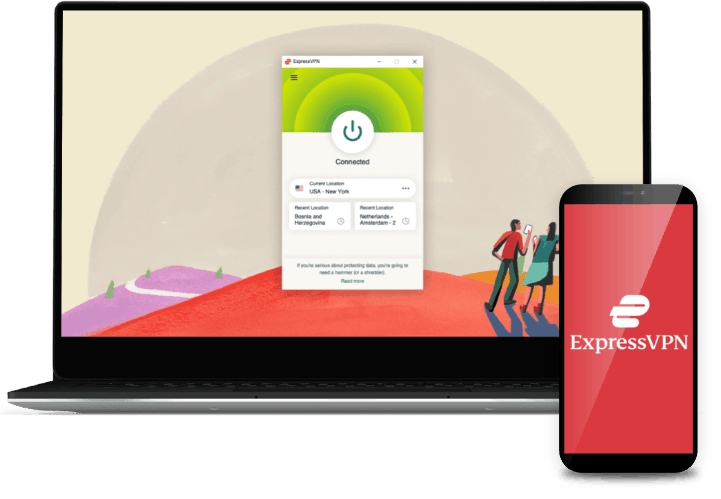


Recent News: ExpressVPN recently debuted three new plan tiers: Basic, Advanced, and Pro. Each plan tier has different limits for simultaneous connections. The Advanced and Pro plans include additional features like a password manager, discounts on Aircove, and an identity protection service.
An ExpressVPN subscription gets you access to thousands of servers across more than 100 countries, which competes with the best of the best such as NordVPN. ExpressVPN’s Basic plan starts at $3.49 per month when you commit to two years, though this tier limits you to 10 simultaneous connections.
So what exactly do you get when you upgrade to the higher tiers? ExpressVPN rolled out these new plans recently, so there’s plenty to explore. Let’s break down the pricing structure and features below.
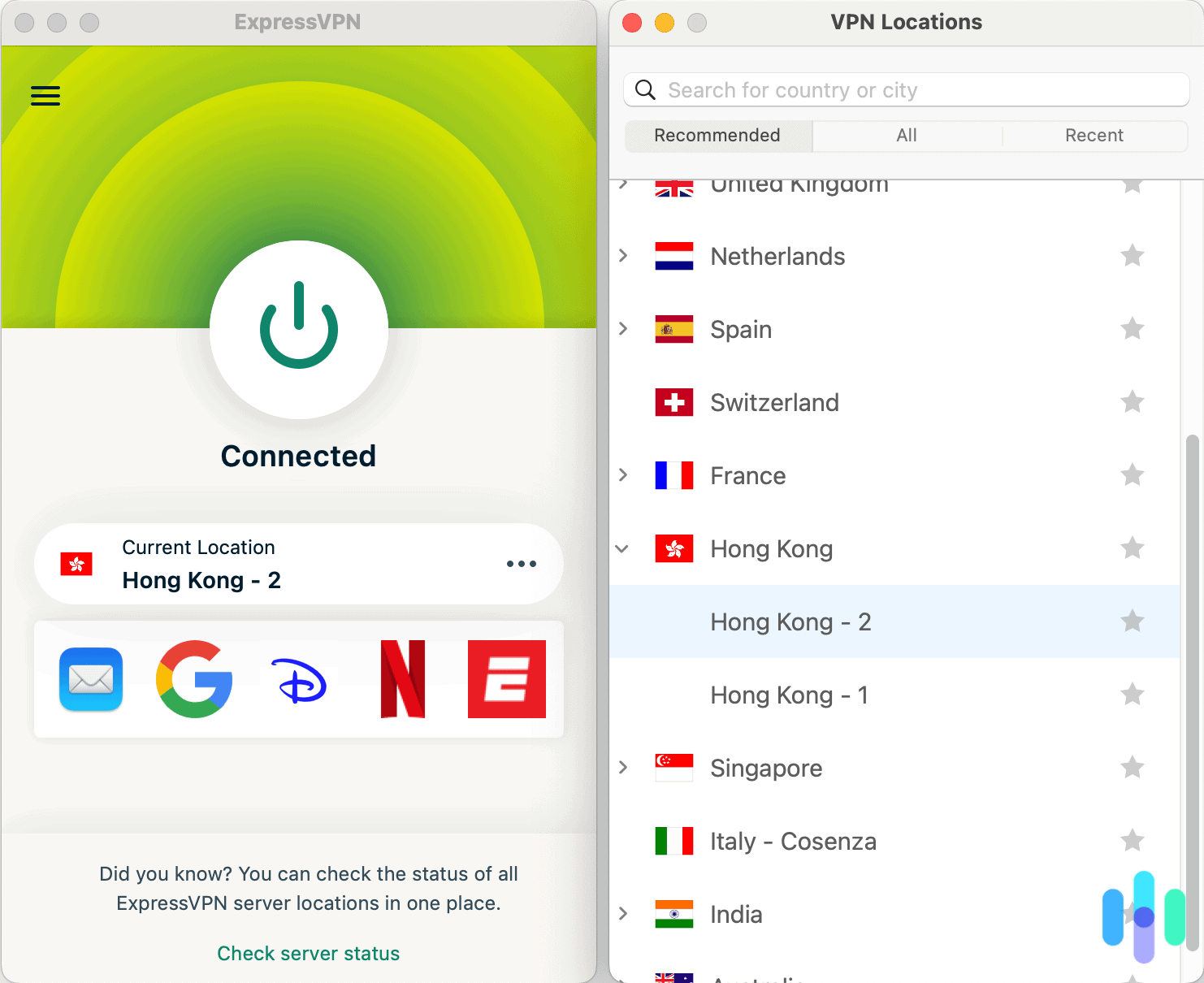
ExpressVPN and Its Place In The VPN Market
In our experience, comparing features and pricing across different VPNs helps you narrow down the best option. We’ve compared ExpressVPN and Surfshark as well as ExpressVPN and Private Internet Access — two VPNs with lower price points. We love the amount of features that ExpressVPN has to offer, but the service might be overkill compared to more affordable options. Click the links for those comparison pages to see what ExpressVPN brings for its higher price point.
ExpressVPN Cost
ExpressVPN plans are more expensive than most competitors, though you can test the service risk-free thanks to their 30-day money-back guarantee for all new subscribers. That even applies to their one-month plan. Here’s a look at ExpressVPN’s current prices:
| ExpressVPN Plan | 1 Month | Monthly rate for 1 Year + 3 months free included (Upfront cost) | Monthly rate for 2 Years + 4 months free included (Upfront cost) |
|---|---|---|---|
| Basic | $12.99 | $4.99 ($74.85) | $3.49 ($97.72) |
| Advanced | $13.99 | $5.99 ($89.85) | $4.49 ($125.72) |
| Pro | $19.99 | $8.99 ($134.85) | $7.49 ($209.72) |
Like most VPN providers, the longer you commit upfront, the better your deal. A two-year ExpressVPN subscription saves you hundreds compared to monthly payments. That brings its pricing closer to the competition, but it’s still on the high end.
With NordVPN’s plans, a two-year subscription starts at around $80 for their Basic tier. That’s slightly less expensive than ExpressVPN’s comparable Basic plan. The savings are more obvious when you compare premium tiers with additional features.
FYI: ExpressVPN isn’t the most expensive option on the market. We tested Astrill VPN recently and the one-year plan would have set us back $180, which is almost double the price of ExpressVPN.
Another consideration with ExpressVPN is the connection limits that vary by tier. The Basic plan allows 10 simultaneous connections, while Advanced offers 12 and Pro is capped at 14. Competitors like Surfshark and Private Internet Access offer unlimited connections. We didn’t hit the ceiling during our tests, so it might not affect you. Still, it’s worth knowing.
On the bright side, ExpressVPN typically throws in bonus months when you sign up for annual plans. Currently, you’ll get three free months with any one-year plan and four free months with any two-year plan. You don’t need to rush as this promotion has been running for a while, although it’s always subject to change.
>> Related: The Best Affordable VPNs
Even without those extra offers, though, ExpressVPN makes a case for itself by offering strong security and privacy features, as we noted in our ExpressVPN review. So next, let’s take a look at how it compares to other VPNs in terms of features.
Pro Tip: You can install ExpressVPN on as many devices as you want. They just can’t all be active simultaneously. If you need more concurrent connections, we suggest setting up ExpressVPN on your router. Then, everything on your Wi-Fi gets VPN protection, but it only counts as one device.
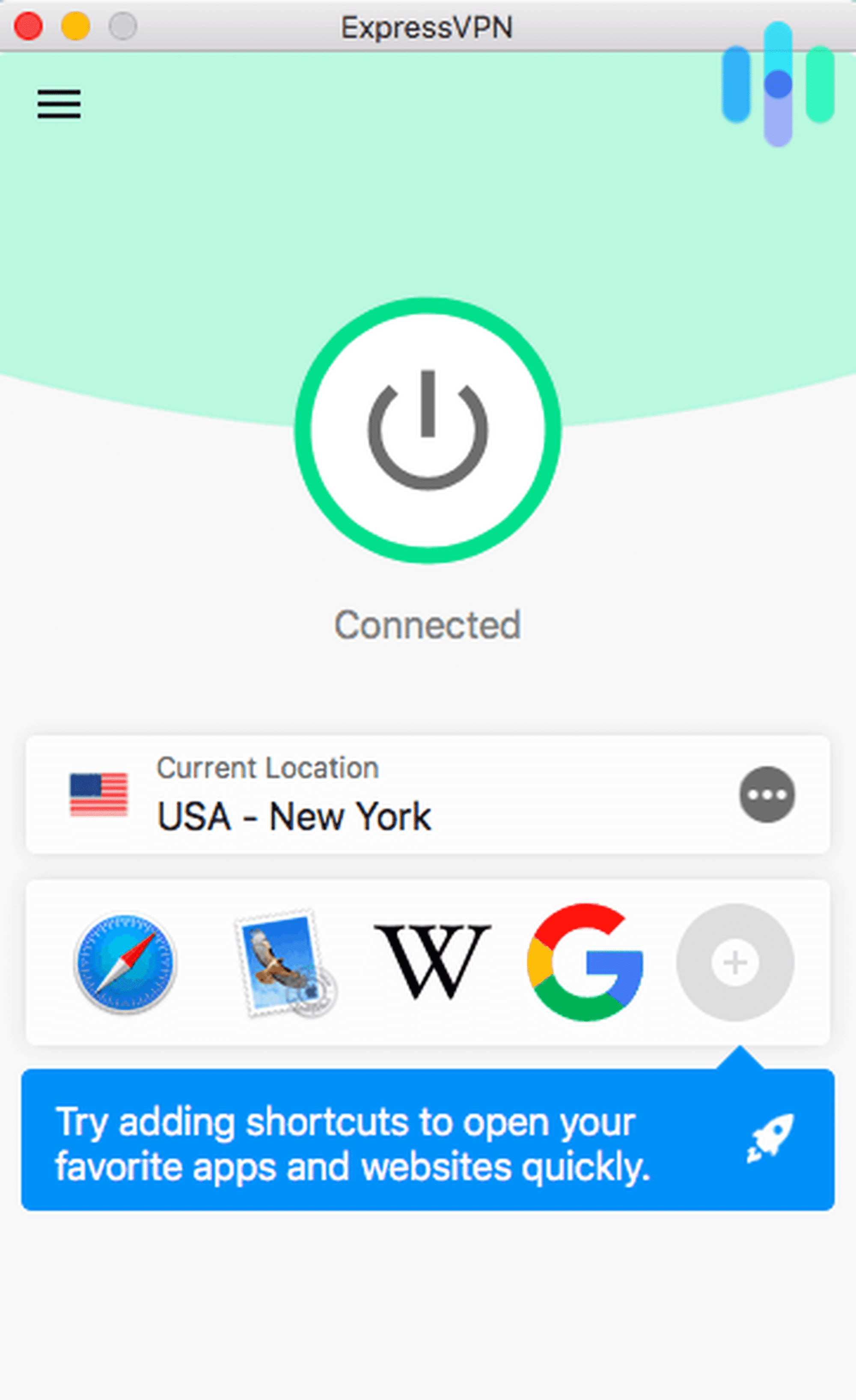
What An ExpressVPN Subscription Includes
ExpressVPN operates over 3,000 servers across 105 countries. While this server count is smaller than some competitors, its geographic distribution is solid and comparable to CyberGhost, which has around 11,000 servers in 100 countries.
FYI: You can compare ExpressVPN and CyberGhost head-to-head or read our CyberGhost review to get a clearer picture.
Another VPN with comparable server infrastructure is NordVPN. Its network includes over 8,400 servers in 127 countries. That’s one factor that makes NordVPN among the fastest VPNs. Despite the smaller server fleet, ExpressVPN manages to keep pace. It still ranked among the top performers when we tested and compared VPN speeds.
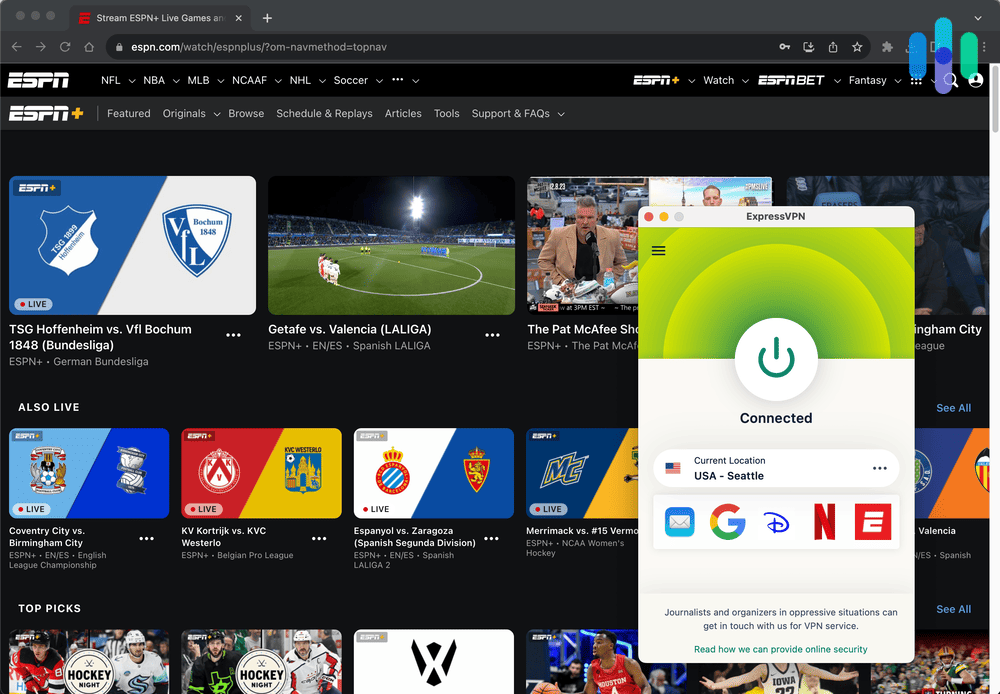
For most people, ExpressVPN provides more than enough server locations. If certain locations are important to you, we recommend checking the server location lists for VPN services. NordVPN has servers in more countries than ExpressVPN, but that doesn’t necessarily make it the better option. Check our comparison of NordVPN vs. ExpressVPN for more details.
As much as we appreciate NordVPN and ExpressVPN, neither offers unlimited simultaneous connections. If you need to connect more than 10 devices at once, check out our Surfshark review. They’re one of our favorites that support unlimited connections.
Pro Tip: Want ExpressVPN on unlimited home devices? ExpressVPN sells Aircove, a VPN router. It’s currently the best VPN router available, and only counts as one device no matter how many devices you connect through it. Learn more in the section below, “ExpressVPN Aircove: Is This VPN Hardware Worth It?”
A Breakdown Of VPN Features
ExpressVPN compares favorably to other top VPNs in terms of features. In addition to offering all the industry-standard features, ExpressVPN delivers in terms of quality. We’ve tested a lot of VPN, and it’s always great to have features that work as advertised.
For ExpressVPN, these were the most important features you’ll gain access to by signing up.
- Kill switch: When our ExpressVPN connection dropped during testing, the app immediately blocked all internet traffic to maintain our privacy. This prevented any data from leaking through an unprotected connection. The kill switch is an essential VPN feature.
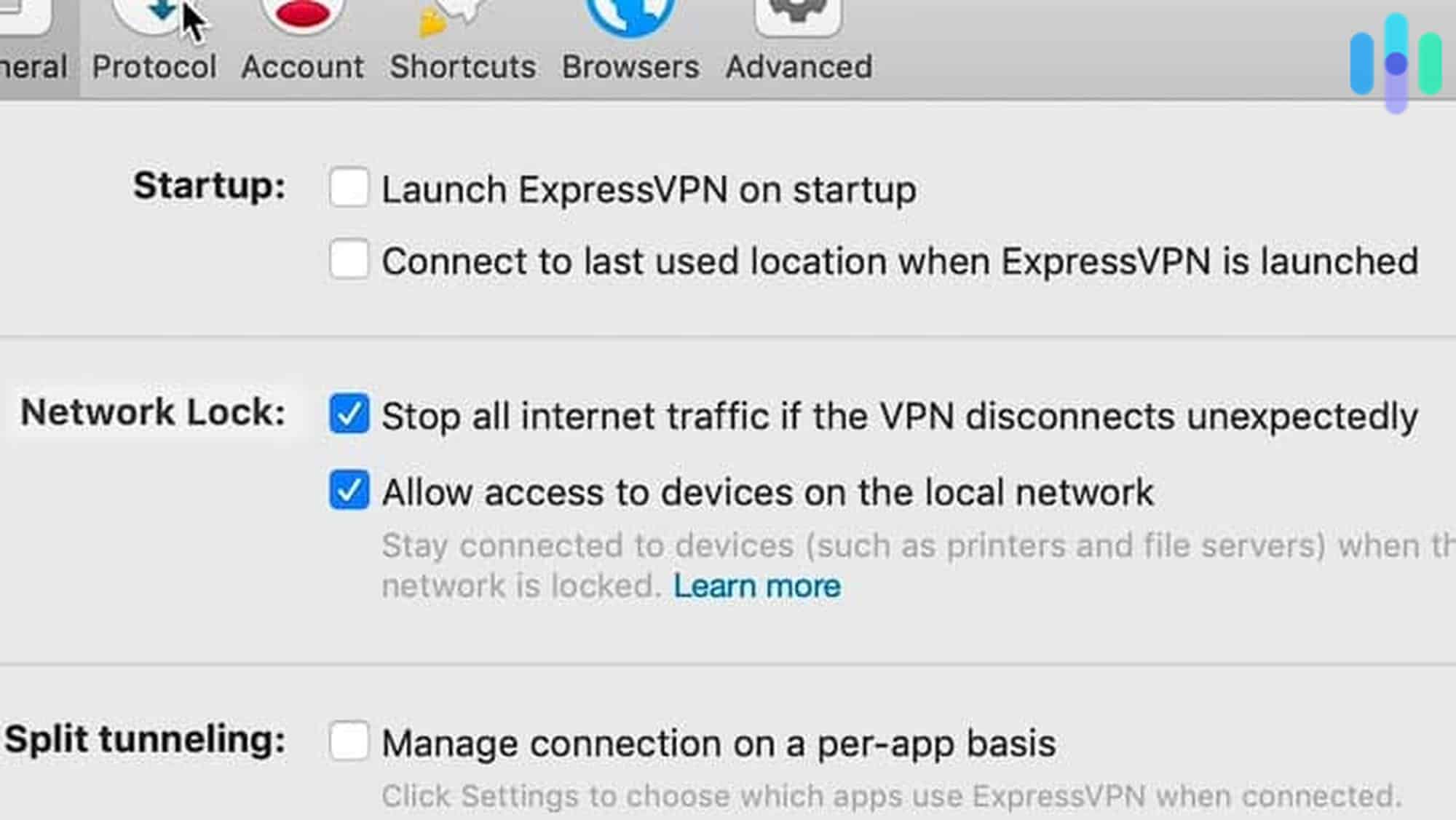
- Rotating IP addresses: A core VPN function is changing your IP address to keep your connection to websites anonymous. It’s not quite as dynamic as Surfshark, which rotates your IP every five to 10 minutes. ExpressVPN changes it with each connection. A fresh IP address every session makes tracking harder and satisfies our privacy needs.
>> Learn More: Dynamic vs. Static IP addresses
- Streaming and torrenting access: VPNs can help you access geo-restricted content from other countries.For instance, getting a U.K. IP address unlocks content exclusive to the U.K., even if you’re in the U.S. Streaming platforms try to block VPN IPs, but ExpressVPN consistently evades detection. It bypassed blocks from all major streaming services, making it one of the best streaming VPNs.
>> Read More: VPNs for Downloading Torrent Anonymously
- Encryption: ExpressVPN encrypted our data using AES-256, the industry’s gold standard. As for protocols, it gave us a choice that included OpenVPN and its own proprietary Lightway protocol. When we weren’t sure which to use, the VPN chose the most appropriate protocol for our specific situation.
- Browser extensions: ExpressVPN offers browser extensions for Chrome, Safari, Edge, and Firefox. We used the Chrome extension. It installed in seconds and connected automatically whenever we opened the browser.
- Well-designed apps for multiple platforms: Most VPNs offer apps for Windows, macOS, iOS, and Android, and we found ExpressVPN’s apps for those platforms easy to use and functional. In addition, though, ExpressVPN has apps for more niched platforms, such as Android TV and Apple TV, making it easier to use on those platforms than VPNs that don’t offer native apps for them.
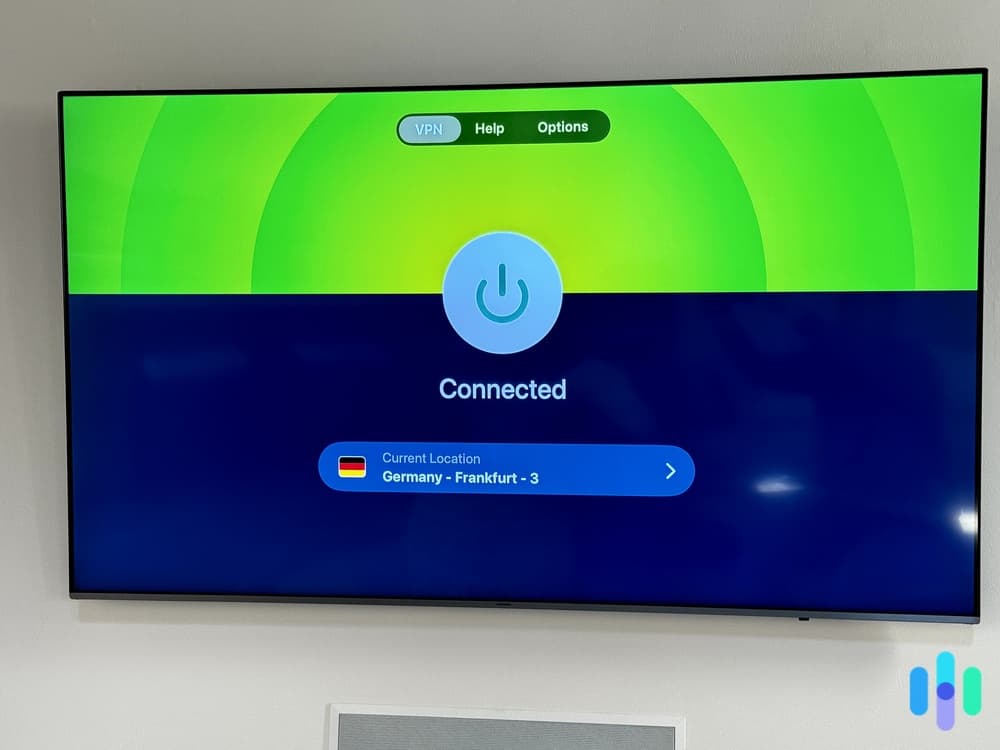
Your Privacy With ExpressVPN
We evaluate a VPN’s privacy protection by looking at the strength of its technical safeguards and the company’s data handling policies. We’ve found every VPN takes a different approach, with some providing better answers than others.
How ExpressVPN Provides Online Privacy
ExpressVPN uses military-grade AES 256-bit encryption to secure your online activities. We’re familiar with this encryption, as most VPNs use it, as do the military and government departments.
ExpressVPN sets itself apart with its proprietary Lightway protocol. This protocol maximizes speed without compromising security or reliability. During testing, we found Lightway fast and stable. It maintained our VPN connection seamlessly when switching between mobile data and Wi-Fi.
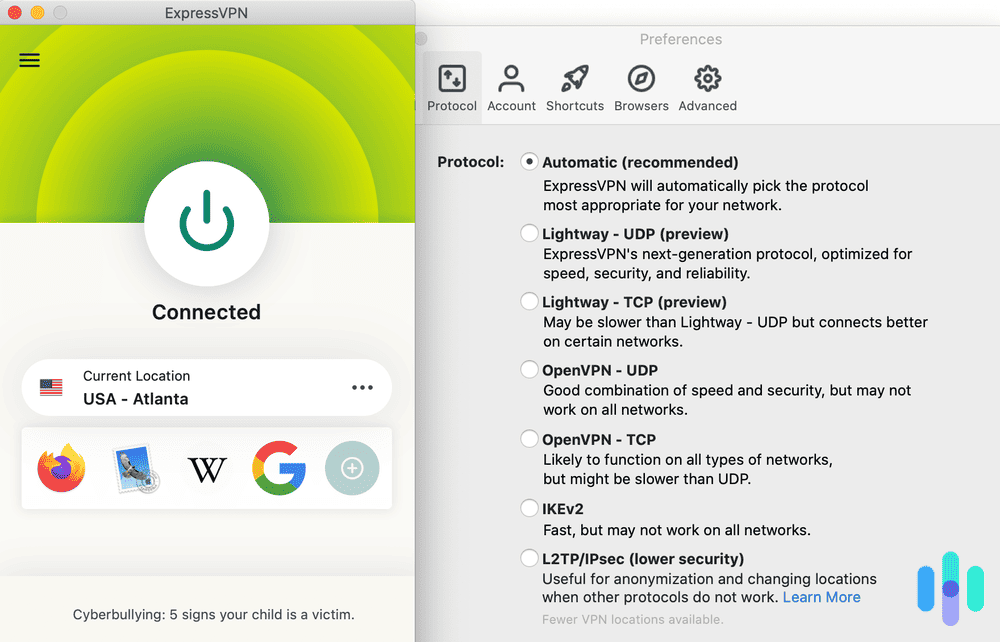
We can tell ExpressVPN takes IP address protection seriously because of its built-in leak prevention. It has a browser extension, for example, that prevents WebRTC leaks by completely disabling your browser’s WebRTC feature. This ensures that your public IP address is always hidden when connected to ExpressVPN.
ExpressVPN Privacy Policy
A privacy policy forms the foundation of any VPN service. ExpressVPN maintains a strict no-logs policy, meaning they don’t collect user activity data. That means if you use an ExpressVPN server in the U.K. to watch BBC iPlayer, neither ExpressVPN nor the BBC will know it’s you behind that U.K. IP address. But how can we trust ExpressVPN’s claims?
ExpressVPN has submitted itself to multiple third-party audits over the years. In 2024, for example, ExpressVPN underwent an independent security audit by Cure53, which verified its no-logs policy and server infrastructure security. Overall, ExpressVPN continues to pass these rigorous audits.
From a legal standpoint, ExpressVPN is protecting its users’ privacy simply by establishing its headquarters in the British Virgin Islands, a country outside the Five Eyes, Nine Eyes, and 14 Eyes surveillance networks. Essentially, that means the government can’t force ExpressVPN to turn over any of its customer data.
ExpressVPN Aircove: Is This VPN Hardware Worth It?
As we mentioned earlier, ExpressVPN subscriptions’ connection limits depend on your tier, ranging from 10 devices on Basic to 14 on Pro. However, there’s a workaround that provides more seamless VPN connections. ExpressVPN sells a router called Aircove that routes all network traffic through its VPN servers.
To clarify, many VPNs can be installed on routers. Aircove, however, comes with ExpressVPN pre-installed. That makes it plug and play, a bit step up compared to other router VPNs with complicated installation instructions. Better yet, all connected devices enjoy ExpressVPN’s protection, bypassing the device limit.
Some of Aircove’s top features are:
- VPN for all devices: You can set up the Aircove router so that every device connected to it is protected by ExpressVPN, even devices that don’t traditionally work with VPNs such as IoT devices and gaming consoles.
- Customizable VPN settings: Unlike VPNs on third-party routers, Aircove lets you configure individual device connections. For instance, you can group devices and assign specific servers. Your smart TVs could connect to a U.K. server for Netflix U.K., while mobile devices use the nearest server for optimal speeds.
- Stable speeds: The Aircove router is designed to deliver stable speeds, with or without a VPN. Its 2.4 GHz band can reach speeds up to 600 Mbps, while its 5 GHz band can reach up to 1,200 Mbps.
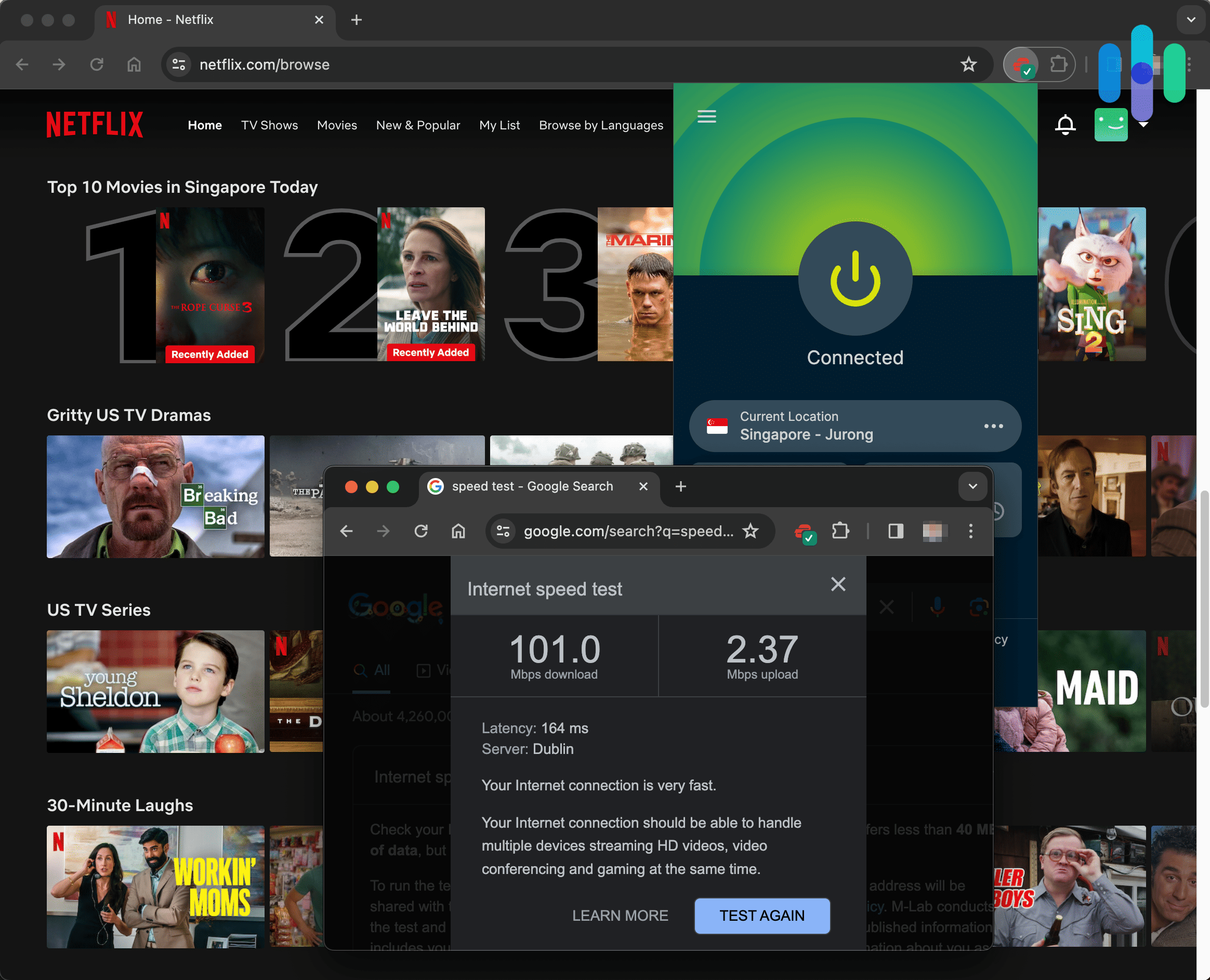
- Network management: You can also manage each device’s internet connectivity. For example, you can block a device from accessing the internet, which can be useful for setting up screen time limits.
- Web app access: The ExpressVPN web app specifically built for the Aircove router lets you easily control VPN and router features.
Another great thing about Aircove is that it’s easy to customize your VPN and network settings. Usually, if you connect a router to a VPN, you’ll need to go through a number of settings just to change your VPN server location. With Aircove, you can do so via an app, and you can even set up multiple locations for different connected devices.
The Aircove router costs $189.90 as of 2025. It’s in the same price range as many mid- to high-end routers. It offers promising networking specs, but compared to similarly priced routers, it’s not as performance-optimized. We could argue that the higher price is due to the VPN features, but also keep in mind that it requires an ongoing ExpressVPN subscription to offer all its VPN features.
Still, the Aircove is an innovative solution for those who need a router that can connect their devices to a VPN, such as those who own internet-connected devices that can’t connect to a VPN directly. A few examples come to mind, like smart home devices, gaming consoles, and older Apple TVs.
>> Check Out: The Best Apple TV VPNs
Aircove Go: Portable VPN Router
Beyond Aircove, ExpressVPN now offers a portable VPN router called Aircove Go. It provides ExpressVPN features like the full-sized Aircove, but Aircove Go fits in your palm. It’s also more affordable at $169.90.
Feature-wise, it’s less powerful than Aircove. The Wi-Fi 6 signal covers about 750 square feet; not ideal for even small homes. However, it’s designed as a portable solution that offers protection on-the-go at hotels or coffee shops. It also doesn’t need an Ethernet cable, unlike the Aircove Go. It can connect directly to a Wi-Fi network.
Is it worth it? That depends on your use-case. If you travel frequently and stay at hotels or short-term rentals with Wi-Fi, Aircove Go makes sense. It’s portable, protects all your devices, and gets around ExpressVPN’s device limit. We could also see it working in a small apartment or home office. Otherwise, we recommend the more powerful Aircove.
Can I Try ExpressVPN for Free?
| Options | ExpressVPN |
|---|---|
| Free trial | None |
| Money-back guarantee | 30 days |
Many VPN companies have free VPN options, albeit with limited data, speed, server options, or features. That can be especially useful when you’re trying to decide which VPN service is right for you. While ExpressVPN does offer free trials for some mobile devices, those trials are not a part of its typical subscription options.
However, with any of the subscriptions, we got a 30-day money-back guarantee. That meant that if at the end of the month we didn’t want to continue with ExpressVPN, we could’ve gotten our money back. Bottom line: no, ExpressVPN doesn’t offer a free trial in any regular sense (although make sure you check out our ExpressVPN deals page for seasonal discounts).
FYI: While ExpressVPN has no free option, if you aren’t satisfied with the service, you can get your money back if you cancel within 30 days.
Deals and Discounts
ExpressVPN may not have a completely free subscription option, but it does offer its fair share of deals and discounts throughout the year.
Black Friday and Cyber Monday
ExpressVPN runs sales every Black Friday and Cyber Monday. It’s typically when they feature their best deals. For example, ExpressVPN’s 2025 Black Friday deal included four bonus months with a two-year subscription and three months with a one-year plan. This significantly reduced the average monthly rate, though it remained pricier than competitors.
Refer A Friend Program
Another way to save is by using ExpressVPN’s referral program. You’ll get 30 days free for each friend who signs up using your referral. Your friends also receive 30 free days when they buy a subscription.
ExpressVPN even includes a referral option in the VPN app. Enter your friend’s email address, and once they purchase a subscription, you get 30 free days. It couldn’t be simpler.
Of course, other VPNs offer similar friend programs. NordVPN’s program works identically to ExpressVPN’s, as shown on our NordVPN deals page. Surfshark’s deals go even further. On top of the one free month, you’ll get six months if you refer three friends and a full year if you refer five. You can always find ways to save on VPN subscriptions, even from premium brands.
Payment Options with ExpressVPN
We paid with a simple Visa, but ExpressVPN offers a number of different payment options, including:
- Credit card: Visa, American Express, Mastercard, JCB, Discover, Diners Club International, Visa Electron
- Paypal
- Bitcoin or BitPay
- Miscellaneous payment methods: Maestro, FanaPay, Mint, OneCard, WebMoney, Giropay, Yandex Money, Alipay, iDEAL, Klarna, UnionPay, Interac Online, Carte Bleue, etc.
We appreciate ExpressVPN’s payment flexibility. For privacy-conscious folks, ExpressVPN’s anonymous payment options like Bitcoin provide an extra layer of discretion.
How Do I Cancel ExpressVPN?
How to cancel ExpressVPN depends on which payment method you use:
- PayPal or credit card:
- Sign in and click Subscription.
- Choose Manage Settings.
- Go to the Automatic Renewal Settings page.
- Turn off Automatic Renewal and confirm.
- BitPay or Paymentwall: Unlike a subscription paid for by PayPal or a credit card, subscriptions paid for by BitPay or Paymentwall don’t renew automatically. That means there’s no need to cancel if you are done with the service at the end of your billing cycle.
Tip: Need help canceling ExpressVPN? Use the live chat option on its website to contact customer support.
Top Features of ExpressVPN
We think ExpressVPN is worth its prices, although providers like NordVPN and Surfshark offer better value. Here’s what we liked about ExpressVPN specifically:
- Strict logging policy: ExpressVPN didn’t hold onto any of our web traffic, IP addresses, metadata, or DNS queries.
- Highly-rated app: We found the ExpressVPN mobile apps for Android and iPhone intuitive and user-friendly. The interfaces are clean and navigation is straightforward.
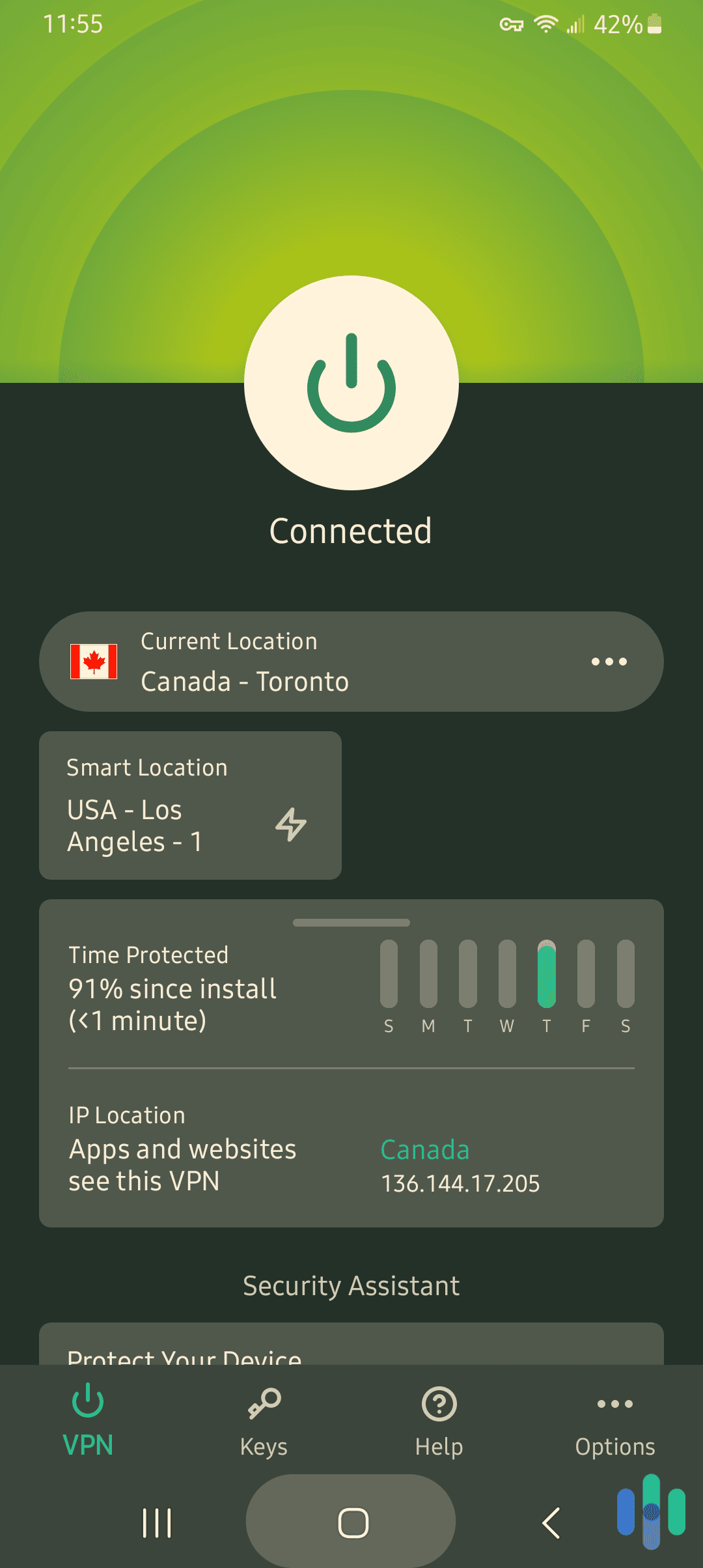
- Quick speeds: When we tested out ExpressVPN in terms of download speed, upload speed, and lag time on our Windows and Mac computers, we didn’t find too much of a noticeable slowdown.
- Headquarters: Since ExpressVPN as a company is based in the British Virgin Islands, it can never be legally forced to give customer data to the government. That’s because the British Virgin Islands aren’t members of Five Eyes, Nine Eyes, and 14 Eyes.
- Split tunneling: When we needed to toggle back and forth between public and private networks, we could leave ExpressVPN connected, as it allows for both connections at the same time.
- Streaming: Not only did ExpressVPN work with Netflix, but it also worked when we wanted to torrent movies and TV shows (because believe it or not, Netflix doesn’t have absolutely everything on it).
- Password Manager: ExpressVPN Keys, included with Advanced and Pro tiers, adds an encrypted password vault to safely store and autofill passwords across devices.
Did You Know? Although they’re a territory of the United Kingdom, the British Virgin Islands (BVI) are self-governed and a non-member to Five Eyes, Nine Eyes, and 14 Eyes. As a result, BVI can’t be forced to make companies give them customer data.
Find out if ExpressVPN can protect your home like other VPNs
We tested ExpressVPN and compared it side-by-side with other brands to give you the full picture.
>> Worth a Read: Best ExpressVPN Alternatives
Summary
ExpressVPN isn’t the cheapest VPN, but it’s far from the most expensive. We recommend it for anyone wanting a straightforward, reliable VPN without overwhelming configuration options. The user interfaces are very easy to use, and there aren’t tons of settings to get bogged down in. By comparison, NordVPN has a ton of settings that mid-level and expert VPN users can tweak based on various use cases.
With a trustworthy logging policy and company history, ExpressVPN is always a go-to suggestion of ours whenever anyone asks us for a VPN. It’s consistently on our “best of” lists, from the best VPNs for iPhones to the best VPNs for Androids. No matter your mobile device, ExpressVPN is a solid option to protect your web traffic without breaking the bank.
ExpressVPN Frequently Asked Questions
Since ExpressVPN is one of the most well-known VPNs on the market, we get asked a ton of questions about it. Here are some answers:
-
Is ExpressVPN legit?
ExpressVPN has more than 3,000 VPN servers in 105 countries around the world, and it’s known for its no-logs policy. The fact that the company is based in the British Virgin Islands adds legitimacy. The British Virgin Islands are not party to the international surveillance alliances Five Eyes, Nine Eyes, and 14 Eyes. In other words, the government can’t compel ExpressVPN to hand over user data.
-
Is ExpressVPN free?
ExpressVPN does offer some free trial options on certain mobile devices. However, for the most part, the service is not free.
Rather, ExpressVPN is a paid service with options available for a month, one year, or two years. The one and two-year packages include free extra months, but there’s no totally free version of ExpressVPN in the traditional sense. However, if you’re looking to test out the service, ExpressVPN does offer a 30-day money-back guarantee.
-
How much does ExpressVPN cost?
The per-month cost of ExpressVPN depends on the plan you pick and the term length you sign up for. One month of the Basic plan costs $12.99, while 28 months of the Pro plan costs $7.49 per month, which is all paid upfront.
ExpressVPN Plan 1 Month Monthly rate for 1 Year + 3 months free included (Upfront cost) Monthly rate for 2 Years + 4 months free included (Upfront cost) Basic $12.99 $4.99 ($74.85) $3.49 ($97.72) Advanced $13.99 $5.99 ($89.85) $4.49 ($125.72) Pro $19.99 $8.99 ($134.85) $7.49 ($209.72) -
Which is better, NordVPN or ExpressVPN?
We recommend NordVPN over ExpressVPN. While they both feature strict logging policies, kill switches, and Netflix and torrenting capabilities, NordVPN’s lower prices and features like Threat Protection make it the better choice.
-
Does ExpressVPN work for Netflix?
Yes, ExpressVPN works with Netflix. This means you can watch the streaming service no matter where you are in the world. It also means you can access other countries’ Netflix libraries when you’re here in the good old U.S. of A.
-
Cybersecurity & Infrastructure Security Agency. (2024). Transition to Advanced Encryption Standard (AES). https://www.cisa.gov/sites/default/files/2024-05/23_0918_fpic_AES-Transition-WhitePaper_Final_508C_24_0513.pdf






